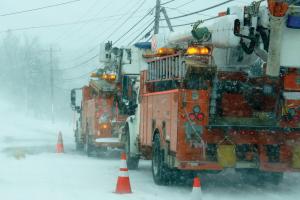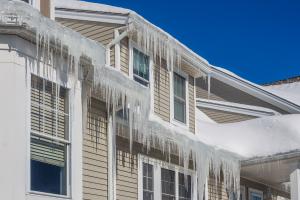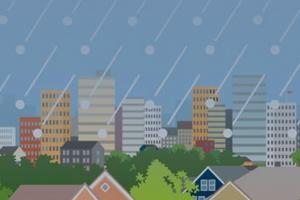How to handle a power outage in cold weather

Severe winter weather can cause power outages and loss of heat. Here are some tips on how to help handle an outage during the winter.
Before the storm
- Set your refrigerator and freezer to coldest settings.
- Check flashlights and portable radios.
- Be sure to have extra batteries on hand.
- Fully charge electronics, including cell phones, tablets and laptops.
- Maintain your HVAC system*
- Make sure the system is working properly and schedule preventative maintenance every year.
- Change the air filters on a regular basis and ensure that exhaust gases are properly ventilated.
- Have a heating system repair service to work with before any maintenance issues arise or unexpected outages. Make sure you can contact them after hours in case they need to come quickly.
Why is it important to maintain an HVAC system?
If you were to lose your heat during a period of extremely cold weather, it could disrupt your business. Not only could it result in cold temperatures inside your building, but pipes could freeze - potentially causing damage (and even larger issues).
- Ensure smoke and carbon monoxide detectors are working correctly and have fresh batteries.
- For those with well water, fill your bathtub with water to help replace the water after flushing.
- Get out extra blankets, coats, hats and mittens.
- Prepare generators and other alternative heating supplies. Start them to ensure they are working*.
- For permanent generators:
- Permanent generators should have a proper maintenance plan that includes weekly, monthly, and annual checks. See the manufacturer’s specifications for more information.
- Run the unit weekly on its maintenance plan to ensure it is properly functioning in case of an emergency. Individual units may have a timer that allows a programmed test to be scheduled. Qualified personnel should oversee these scheduled weekly tests.
- Check the generator enclosure for loose debris or other conditions that could cause the unit to not function properly.
- For portable generators
- Store in a dry location.
- Set up a maintenance schedule to include periodic test runs for the unit.
- When renting a portable unit, make sure you have a contract in place ahead of winter weather. Also consider where the unit will be housed, how it will be delivered, and who will be responsible
for receiving it. Note that delivery of the unit can be delayed due to the severe winter weather, which may cause some business downtime.
- For permanent generators:
Why is it important to service a generator?
The best time to maintain a generator is before a storm or disaster strikes. When the unexpected happens, power lines may be down, professional help may not be available and roads could be blocked. Having backup power can help keep building temperatures steady and reduce the risk of frozen pipes which could lead to both damage and a disruption in business.
During the outage
- Check with your power company for updates. Many have outage maps and information on their websites.
- Use 911 for true emergencies only.
- Use flashlights, instead of candles, as much as possible.
- Take safety precautions when using a generator. Never run generators indoors where carbon monoxide can cause harm.
- Dress warmly, in layers.
- If you lose your heat, close the doors of unused rooms and place towels under the doors. At night, cover windows with shades, extra blankets or sheets.
- Unplug sensitive electronics to protect them from surges when power is restored.
- Know and watch for signs of frostbite and hypothermia.
After the outage
- Be careful around downed power lines. Assume they are live and never touch them or drive over them.
- Throw away foods that have been exposed to greater than 40 degree temperatures for more than two hours.
- Safely put back all items, such as flashlights, batteries, candles, generators, to have them ready for the future.
Be sure to have the phone numbers of your independent insurance agent and insurance company should you need to file a claim.
Sources: Massachusetts Emergency Management Agency, The Hanover Risk Management, *IBHS
Related resources
How to handle a power outage in cold weather
Severe winter weather can cause power outages and loss of heat. Here are some tips on how to help handle an outage during the winter.
Before the storm
- Set your refrigerator and freezer to coldest settings.
- Check flashlights and portable radios.
- Be sure to have extra batteries on hand.
- Fully charge electronics, including cell phones, tablets and laptops.
- Maintain your HVAC system*
- Make sure the system is working properly and schedule preventative maintenance every year.
- Change the air filters on a regular basis and ensure that exhaust gases are properly ventilated.
- Have a heating system repair service to work with before any maintenance issues arise or unexpected outages. Make sure you can contact them after hours in case they need to come quickly.
Why is it important to maintain an HVAC system?
If you were to lose your heat during a period of extremely cold weather, it could disrupt your business. Not only could it result in cold temperatures inside your building, but pipes could freeze - potentially causing damage (and even larger issues).
- Ensure smoke and carbon monoxide detectors are working correctly and have fresh batteries.
- For those with well water, fill your bathtub with water to help replace the water after flushing.
- Get out extra blankets, coats, hats and mittens.
- Prepare generators and other alternative heating supplies. Start them to ensure they are working*.
- For permanent generators:
- Permanent generators should have a proper maintenance plan that includes weekly, monthly, and annual checks. See the manufacturer’s specifications for more information.
- Run the unit weekly on its maintenance plan to ensure it is properly functioning in case of an emergency. Individual units may have a timer that allows a programmed test to be scheduled. Qualified personnel should oversee these scheduled weekly tests.
- Check the generator enclosure for loose debris or other conditions that could cause the unit to not function properly.
- For portable generators
- Store in a dry location.
- Set up a maintenance schedule to include periodic test runs for the unit.
- When renting a portable unit, make sure you have a contract in place ahead of winter weather. Also consider where the unit will be housed, how it will be delivered, and who will be responsible
for receiving it. Note that delivery of the unit can be delayed due to the severe winter weather, which may cause some business downtime.
- For permanent generators:
Why is it important to service a generator?
The best time to maintain a generator is before a storm or disaster strikes. When the unexpected happens, power lines may be down, professional help may not be available and roads could be blocked. Having backup power can help keep building temperatures steady and reduce the risk of frozen pipes which could lead to both damage and a disruption in business.
During the outage
- Check with your power company for updates. Many have outage maps and information on their websites.
- Use 911 for true emergencies only.
- Use flashlights, instead of candles, as much as possible.
- Take safety precautions when using a generator. Never run generators indoors where carbon monoxide can cause harm.
- Dress warmly, in layers.
- If you lose your heat, close the doors of unused rooms and place towels under the doors. At night, cover windows with shades, extra blankets or sheets.
- Unplug sensitive electronics to protect them from surges when power is restored.
- Know and watch for signs of frostbite and hypothermia.
After the outage
- Be careful around downed power lines. Assume they are live and never touch them or drive over them.
- Throw away foods that have been exposed to greater than 40 degree temperatures for more than two hours.
- Safely put back all items, such as flashlights, batteries, candles, generators, to have them ready for the future.
Be sure to have the phone numbers of your independent insurance agent and insurance company should you need to file a claim.
Sources: Massachusetts Emergency Management Agency, The Hanover Risk Management, *IBHS
Related resources
How to handle a power outage in cold weather
Severe winter weather can cause power outages and loss of heat. Here are some tips on how to help handle an outage during the winter.
Before the storm
- Set your refrigerator and freezer to coldest settings.
- Check flashlights and portable radios.
- Be sure to have extra batteries on hand.
- Fully charge electronics, including cell phones, tablets and laptops.
- Maintain your HVAC system*
- Make sure the system is working properly and schedule preventative maintenance every year.
- Change the air filters on a regular basis and ensure that exhaust gases are properly ventilated.
- Have a heating system repair service to work with before any maintenance issues arise or unexpected outages. Make sure you can contact them after hours in case they need to come quickly.
Why is it important to maintain an HVAC system?
If you were to lose your heat during a period of extremely cold weather, it could disrupt your business. Not only could it result in cold temperatures inside your building, but pipes could freeze - potentially causing damage (and even larger issues).
- Ensure smoke and carbon monoxide detectors are working correctly and have fresh batteries.
- For those with well water, fill your bathtub with water to help replace the water after flushing.
- Get out extra blankets, coats, hats and mittens.
- Prepare generators and other alternative heating supplies. Start them to ensure they are working*.
- For permanent generators:
- Permanent generators should have a proper maintenance plan that includes weekly, monthly, and annual checks. See the manufacturer’s specifications for more information.
- Run the unit weekly on its maintenance plan to ensure it is properly functioning in case of an emergency. Individual units may have a timer that allows a programmed test to be scheduled. Qualified personnel should oversee these scheduled weekly tests.
- Check the generator enclosure for loose debris or other conditions that could cause the unit to not function properly.
- For portable generators
- Store in a dry location.
- Set up a maintenance schedule to include periodic test runs for the unit.
- When renting a portable unit, make sure you have a contract in place ahead of winter weather. Also consider where the unit will be housed, how it will be delivered, and who will be responsible
for receiving it. Note that delivery of the unit can be delayed due to the severe winter weather, which may cause some business downtime.
- For permanent generators:
Why is it important to service a generator?
The best time to maintain a generator is before a storm or disaster strikes. When the unexpected happens, power lines may be down, professional help may not be available and roads could be blocked. Having backup power can help keep building temperatures steady and reduce the risk of frozen pipes which could lead to both damage and a disruption in business.
During the outage
- Check with your power company for updates. Many have outage maps and information on their websites.
- Use 911 for true emergencies only.
- Use flashlights, instead of candles, as much as possible.
- Take safety precautions when using a generator. Never run generators indoors where carbon monoxide can cause harm.
- Dress warmly, in layers.
- If you lose your heat, close the doors of unused rooms and place towels under the doors. At night, cover windows with shades, extra blankets or sheets.
- Unplug sensitive electronics to protect them from surges when power is restored.
- Know and watch for signs of frostbite and hypothermia.
After the outage
- Be careful around downed power lines. Assume they are live and never touch them or drive over them.
- Throw away foods that have been exposed to greater than 40 degree temperatures for more than two hours.
- Safely put back all items, such as flashlights, batteries, candles, generators, to have them ready for the future.
Be sure to have the phone numbers of your independent insurance agent and insurance company should you need to file a claim.
Sources: Massachusetts Emergency Management Agency, The Hanover Risk Management, *IBHS
Related resources
How to handle a power outage in cold weather
Severe winter weather can cause power outages and loss of heat. Here are some tips on how to help handle an outage during the winter.
Before the storm
- Set your refrigerator and freezer to coldest settings.
- Check flashlights and portable radios.
- Be sure to have extra batteries on hand.
- Fully charge electronics, including cell phones, tablets and laptops.
- Maintain your HVAC system*
- Make sure the system is working properly and schedule preventative maintenance every year.
- Change the air filters on a regular basis and ensure that exhaust gases are properly ventilated.
- Have a heating system repair service to work with before any maintenance issues arise or unexpected outages. Make sure you can contact them after hours in case they need to come quickly.
Why is it important to maintain an HVAC system?
If you were to lose your heat during a period of extremely cold weather, it could disrupt your business. Not only could it result in cold temperatures inside your building, but pipes could freeze - potentially causing damage (and even larger issues).
- Ensure smoke and carbon monoxide detectors are working correctly and have fresh batteries.
- For those with well water, fill your bathtub with water to help replace the water after flushing.
- Get out extra blankets, coats, hats and mittens.
- Prepare generators and other alternative heating supplies. Start them to ensure they are working*.
- For permanent generators:
- Permanent generators should have a proper maintenance plan that includes weekly, monthly, and annual checks. See the manufacturer’s specifications for more information.
- Run the unit weekly on its maintenance plan to ensure it is properly functioning in case of an emergency. Individual units may have a timer that allows a programmed test to be scheduled. Qualified personnel should oversee these scheduled weekly tests.
- Check the generator enclosure for loose debris or other conditions that could cause the unit to not function properly.
- For portable generators
- Store in a dry location.
- Set up a maintenance schedule to include periodic test runs for the unit.
- When renting a portable unit, make sure you have a contract in place ahead of winter weather. Also consider where the unit will be housed, how it will be delivered, and who will be responsible
for receiving it. Note that delivery of the unit can be delayed due to the severe winter weather, which may cause some business downtime.
- For permanent generators:
Why is it important to service a generator?
The best time to maintain a generator is before a storm or disaster strikes. When the unexpected happens, power lines may be down, professional help may not be available and roads could be blocked. Having backup power can help keep building temperatures steady and reduce the risk of frozen pipes which could lead to both damage and a disruption in business.
During the outage
- Check with your power company for updates. Many have outage maps and information on their websites.
- Use 911 for true emergencies only.
- Use flashlights, instead of candles, as much as possible.
- Take safety precautions when using a generator. Never run generators indoors where carbon monoxide can cause harm.
- Dress warmly, in layers.
- If you lose your heat, close the doors of unused rooms and place towels under the doors. At night, cover windows with shades, extra blankets or sheets.
- Unplug sensitive electronics to protect them from surges when power is restored.
- Know and watch for signs of frostbite and hypothermia.
After the outage
- Be careful around downed power lines. Assume they are live and never touch them or drive over them.
- Throw away foods that have been exposed to greater than 40 degree temperatures for more than two hours.
- Safely put back all items, such as flashlights, batteries, candles, generators, to have them ready for the future.
Be sure to have the phone numbers of your independent insurance agent and insurance company should you need to file a claim.
Sources: Massachusetts Emergency Management Agency, The Hanover Risk Management, *IBHS





